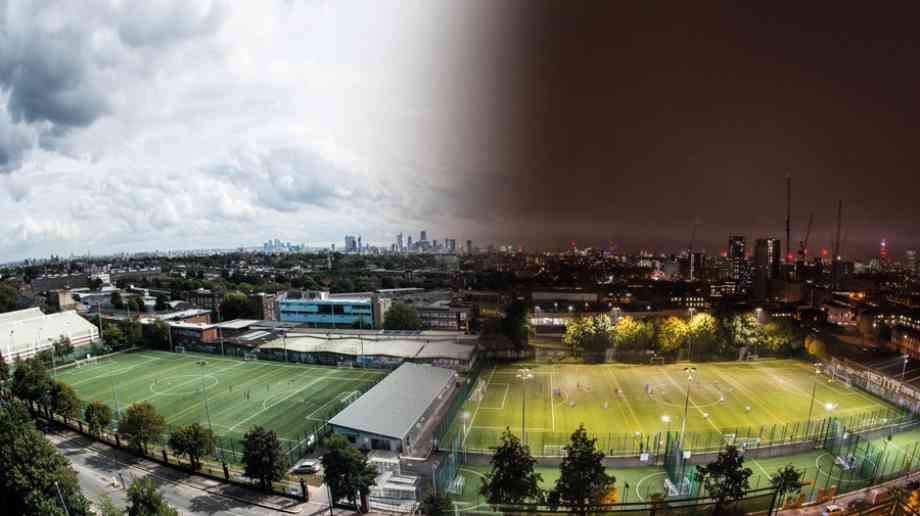
Playing through the winter winds
Frozen pitches, submerged penalty areas and cold, damp changing rooms; the harshness of the British winter is traditionally unwelcome in our grassroots game. That is because too many of our country’s natural grass pitches are simply unable to be used during poor weather because they become waterlogged or frozen, or are not floodlit and therefore stop play after 4pm in the winter. Either way, grassroots footballers suffer and are left with nowhere to play the game purely for the love of doing so.
This is why the Football Foundation is working to ensure that the elements no longer dictate when football can be played. By improving the country’s inventory of sports facilities, including those found in schools, the Foundation is ensuring that participation in the sport maintains its high levels all-year round and that students in particular can fulfil their potential both physically and academically.
Sustainable playing time
Poor facilities are the main barrier to sporting participation in this country. Investment into facilities, specifically third generation (3G) artificial grass pitches (AGPs), prove a catalyst for more than noticeable rises in participation. Increases of seven per cent in football and eight per cent in multi-sport participation over the last year at Football Foundation-funded facilities demonstrate this. More young people are getting involved in sport and can now play for longer into the evening on a floodlit 3G AGP, which sustains play for 90 hours a week compared to just five on a natural grass pitch in the winter.
282 of the 555 artificial grass pitches (AGPs) that the Foundation has developed are at schools across England, meaning that thousands of students now have access to state-of-the-art pitches for both physical education and extra-curricular activity. There is also better provision for study in sports science topics, all of which can happen undeterred by the weather.
Liz Bishopp, business manager at the Blandford School, said: “We have seen the benefit of fewer fixtures being cancelled due to the ground conditions. Another bonus has been the growth in participation, partly because users know that they won’t be finishing their sessions covered in mud.”
The Blandford School received a £350,000 grant from the Premier League & The FA Facilities Fund to build a new state‑of‑the‑art AGP in 2014. Before receiving funding, the school were only able to play on a grass field, of which its hours of play were always limited by winter weather.
Former Southampton, Everton and England striker, James Beattie visited the Blandford School’s pitch. He said: “Young people wanting to play and learn about the game can only do this if they have access to quality facilities and this pitch is certainly that”, he said. Beattie spoke of how he played on a similar facility in his youth days at Blackburn Rovers: ‘‘We need more of them, lots more.”
The Dorset-based facility accommodates not only all 700 of the school’s pupils but local grassroots clubs, Blandford Youth Football Club, Blandford United, AFC Blandford, Stourpaine FC, and Wimborne Town Football Club. AFC Bournemouth’s Community Trust, Arsenal’s Soccer Schools and Dorset County FA also base sessions at the facility.
So not only can more sport be played but the quality of the experience for a grassroots footballer is also hugely improved because the surface is so good. Indeed the Football Foundation’s recent ‘Player and Coaches Survey’ found that 75 per cent of coaches were of the opinion that Foundation-funded facilities allow them to deliver a higher quality of session.
For example, Roland Davey, assistant head teacher at Matthew Arnold School in Staines made clear that: “With a pitch that allows the ball to run true you can work on more technical aspects of the game, without worrying about a ball bouncing over a student’s foot! There are no inconsistencies in our pitch now.”
Matthew Arnold received £254,438 from the Premier League & The FA Facilities Fund in 2014 to build the 3G AGP and as a result, the Chelsea Foundation now run a unique BTEC academic and football programme at the school that allows pupils to gain qualifications. Football Foundation pitches are more than just spaces for people to play football – they can help to transition a student into a career. During the 2014/15 season for instance, 28,033 coaching qualifications were gained at Football Foundation-funded sites.
Educational benefits
The benefits of these kinds of facilities in a practical sense are clear, but it’s important to remember what effect this can have on a student’s broader education.
Ponteland’s head teacher, Caroline Pryer, explains: “Having a physical outlet year-round improves academic success, our students also have the chance to take pride in something and take care of it.”
The School’s pitch was opened by legendary former England and Newcastle United FC striker, Alan Shearer. The facility is also used by local club Ponteland United FC as well as Newcastle United’s Foundation.
The former England captain said: “I never had anything like this at my school when I was their age. I hope the community get tremendous use out of it. Use it, cherish it and if they have a dream, go ahead and achieve it.”
Shearer’s hope of a well-used pitch will be met with participation expected to rocket by 50 per cent. More needs to be done to improve this country’s sports infrastructure. With just over 600 artificial pitches across the country, of which 555 were delivered by the Football Foundation, England is still miles behind Germany, as an example, who have over 4,000 of these similar facilities.
Since 2000, the Football Foundation has delivered funding from the Premier League, The FA and the government in the shape of 14,000 grants worth more than £540m towards improving grassroots sport, which it has used to attract additional partnership funding of over £777m – making a total of over £1.3bn of investment into the grassroots game.
The formula is simple: build more quality facilities and more people will get involved in sport. Few can deny that playing sport is off‑putting when you have to get changed in an old, rusty shipping container to then run out to pitches that will be unplayable after rainfall.
Students can look to the future safe in the knowledge that the investment from the Football Foundation through the Premier League, The FA and the government will continue to be made at the lowest levels of the game to strengthen our nation’s favourite sport.
A strong base at the bottom of the football pyramid strengthens the elite level at the top and everything in between.
Further information
www.footballfoundation.org.uk
Latest News
19/12/2025 - 09:54
The Education Committee has expanded its ongoing inquiry into the early years sector to examine how safeguarding can be strengthened in early years settings.
18/12/2025 - 09:25
The UK will be rejoining the Erasmus programme in 2027, following a package of agreements with the EU.
17/12/2025 - 09:31
Ofqual has fined exam board Pearson more than £2 million in total for serious breaches in three separate cases between 2019 and 2023 which collectively affected tens of thousands of students.
16/12/2025 - 09:19
The average funding rates will increase by 4.3% for under 2s, and by almost 5% for 3-and-4-year-olds.
15/12/2025 - 10:30
Local colleges are set to receive £570 million in government funding to expand training facilities in areas such as construction and engineering.







